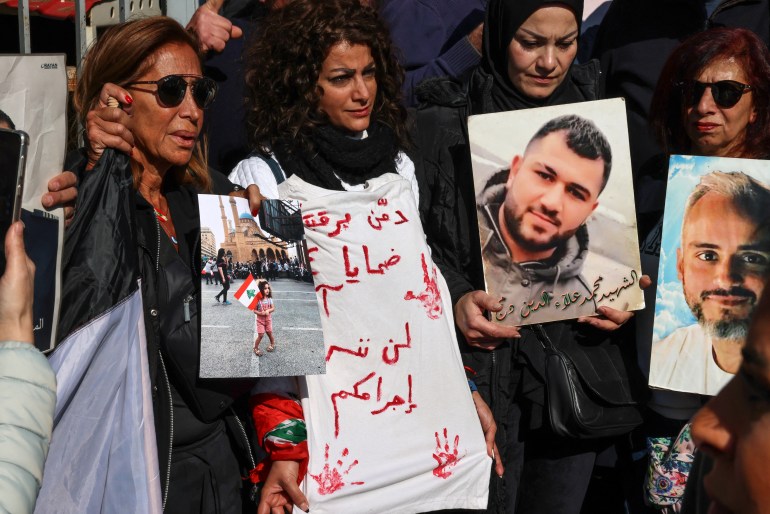Dozens protest in Lebanese capital against the public prosecutor’s attempt to stop a judge from continuing his investigation.
At least 218 people died on August 4, 2020, after hundreds of tonnes of ammonium nitrate detonated in the largest non-nuclear explosion recorded in history.
The event has left victims’ families and many other Lebanese feeling repeatedly let down by the state and waiting for justice.
Most recently, an effort by Judge Tarek Bitar to resume his investigation has led to a pushback from Lebanon’s judicial and political establishment.
Security forces on Thursday drove back the pro-Bitar protesters trying to make their way into the Justice Palace after breaking the lock of the entrance gate.
“People are angry here,” said Al Jazeera’s Zena Khodr, reporting from the protest, where scuffles broke out. “They have been demanding justice and accountability for more than two years, but the investigation has made no progress, and it has been repeatedly stalled by political interference.”
The latest development involves a legal showdown between Bitar and Lebanon’s top public prosecutor, Ghassan Oweidat. Lebanon’s judiciary is prone to political influence with many appointments determined by politicians.
Bitar announced on Monday the resumption of his investigation after a 13-month suspension due to legal complaints and high-level political pressure.
But Oweidat objected, saying Bitar did not have the authority to circumvent the complaints. He filed charges against the judge and released the remaining detainees still held as part of the investigation.
Bitar told Al Jazeera that he would continue his investigation and called Oweidat’s actions illegal.

“Since the aftermath of the explosion, there were demands for an international investigation because this is a country with a culture of impunity,” Khodr said. “The families of the victims believe that there will never be justice if there is a domestic investigation.”
The top prosecutor’s move was not welcomed by the families of the victims.
“This is a judicial scandal,” said Ali Abbas, a lawyer protesting on Thursday. “Families of the victims are being wronged. There is complete disregard for this crime.”
Lebanon’s Supreme Judicial Council is to meet on Thursday to discuss developments in the port blast investigation.
Families of the victims said they feared the country’s most senior judges could decide to remove Bitar from the case or appoint a supplementary judge who would effectively sap Bitar’s power.
Bitar told the Reuters news agency on Wednesday that Oweidat “had no right” to file a charge or release detainees because Oweidat himself has been charged over the explosion.
Oweidat also issued a travel ban against Bitar and a decision saying the judge did not have the authority to resume his investigation.
